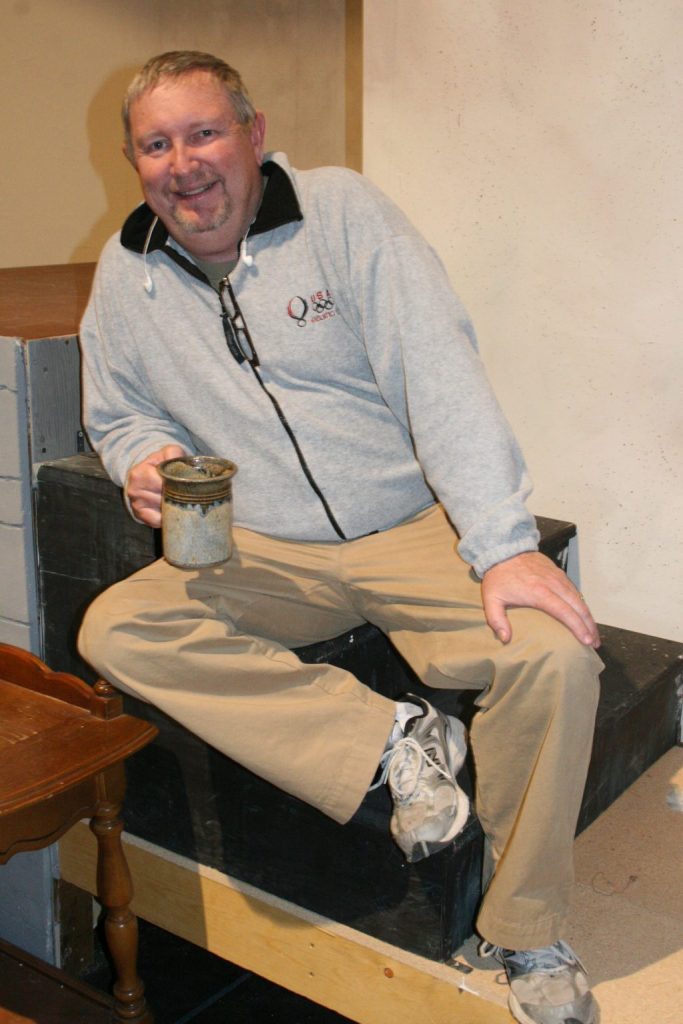Set designer finds different solutions to problems
A lot more happens when a play is cast than actors rehearsing. Grady McEvoy who, has been a theatre instructor at Utah State University- College of Eastern Utah for 25 years, would know.
The thing McEvoy loves most about his job is that he is able to find solutions to unique problems and the different challenges he is faced with every day. Every show is different. “Every four to six weeks, I’m challenged with a different problem, and sometimes don’t have practical solutions. You have to try to find the next best thing and also trick the audience’s eye,” he said.

This archived article was written by: Valeria Moncada
A lot more happens when a play is cast than actors rehearsing. Grady McEvoy who, has been a theatre instructor at Utah State University- College of Eastern Utah for 25 years, would know.
The thing McEvoy loves most about his job is that he is able to find solutions to unique problems and the different challenges he is faced with every day. Every show is different. “Every four to six weeks, I’m challenged with a different problem, and sometimes don’t have practical solutions. You have to try to find the next best thing and also trick the audience’s eye,” he said.
McEvoy taught technical theatre at Snow College four years at the beginning of his career. “I saw more opportunity at USU-CEU to advance with my career.” That’s when he moved to the Price campus.
When choosing what setup to make for each play several elements McEvoy has to look at including; costume types, time period, stage style, and finally the script. “You adjust to the situation and to what the director wants,” he said.
McEvoy does most of the craftsmanship on the stage setups himself. But he also has students help build the sets. Depending on the production, most sets take about three and a half weeks to build. But there are some that take about four to six weeks, depending on the size of the set. “The Foreigner” has taken the full four weeks to build.
He is from Delta, Utah, but grew up in Dugway Proving Grounds Military Base, where he lived for 19 years. “We had all of the conveniences, it was a great place to grow up. We were able to play a lot,” he said.
Some of McEvoy’s biggest accomplishments are the theatre program, the quality the department produces overall, and that he has been able to enhance it. Also, being a member of the Carbon County School Board for eight years. It presented new and interesting challenges. He was a board member for four years, and then was a president for four years as well. “It was a difficult job at times and a great experience,” he said. The community built playground, the Dino Mine Park, which he helped build. And his house, which just turned 100 years old, “My house has been a labor of love for my wife and I,” he said.
McEvoy graduated from Dugway High School, changed his major from music to theatre at Utah State University. He continued his education at Snow College and received his associate’s degree. He was hired at Snow College then finished his bachelor’s of fine arts degree from USU at the same time. He completed a master’s of arts degree at Idaho State University.
“I do wish I could have completed an MFA terminal degree though, the more education, the better.” McEvoy said.
“You can do anything you want, and you can make it happen,” he said.
McEvoy came from a small high school, he didn’t really know what opportunities lied ahead. He didn’t really have a great focus on his future until technical theatre captured his attention. He wanted to be a singer, and then he found his passion in teaching and producing plays.
“For this job you have to have a willingness to sacrifice a great deal,” McEvoy said.
McEvoy’s creative genius in set designs can be seen in next week’s production of “The Foreigner” from Feb. 10-15 with curtain time at 7:30 p.m. in the Geary Theatre. A Saturday matinee performance on Feb. 12 is scheduled at 2 p.m. with no Sunday performance. Ticket prices are $10 for adults, $7 for seniors, $5 for CEU Faculty/Staff and non-USU/CEU Students and $3 for USU Eastern students with a current student ID.




